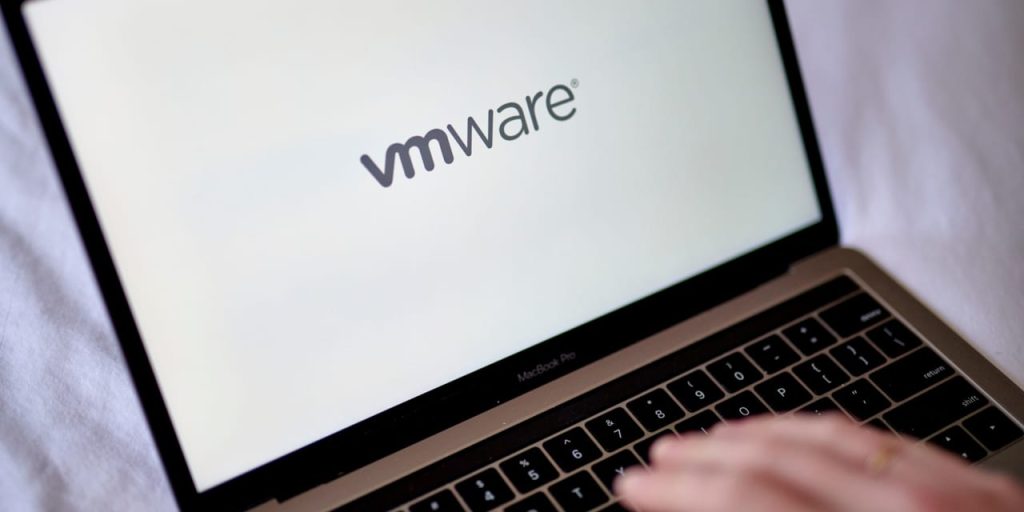There was some curious trading in shares of
VMware
Tuesday as the stock declined but changed hands above the cash value of the
Broadcom
offer for the software company
Investors apparently are betting on the possibility that the stock election period for VMware investors that ended Monday could be extended.
The companies plan to close on the transaction on Oct. 30. That is complicated by possible antitrust problems in China that may delay the closing or possibly kill the deal.
The thinking on Wall Street is that the two companies could reopen the election period if the deal gets delayed much past Oct. 30 and allow investors a fresh crack at getting the more valuable stock consideration option in the deal.
VMW shares (ticker VMW) were off 3.6% at $150.25 Tuesday but finished above the $142.50-a-share value of the Broadcom (AVGO) offer. Broadcom was up 2.1% at $880.64.
Here is the complex backdrop. When Broadcom agreed to buy VMware in May 2022 for what is now a roughly $70 billion deal, it offered VMware holders the choice of stock (0.252 a share of Broadcom for each VMware share) or $142.50 in cash.
The value of the stock and cash offered was initially about equal but the stock portion became much more valuable with Broadcom stock up more than 60% since the deal was announced.
Broadcom capped the value of the stock portion of the deal at 50% of VMware shares and as a result, VMware recently investors figured that they would get roughly 50% cash and 50% stock as consideration for the deal.
With the deal scheduled to close on Oct. 30, the two companies last week announced an election deadline of Monday for VMware holders to choose whether they wanted stock or cash.
The companies have indicated that VMware shareholders who made no election would receive the “undersubscribed” consideration which likely is cash.
The stock election was worth about $217 per VMware share on Monday’s close (0.252 times $862), way above the cash option of $142.50. The blended value of the transaction (50% cash and 50% stock) was about $180 a share on Monday’s close.
Anyone who bought VMware Tuesday, however, would appear to get the cash option of the deal, or $142.50.
So why is VMware trading above that level?
While the two companies haven’t indicated any problems, the Financial Times reported last week that the Chinese State Administration of Market Regulation is likely to delay signing off on the deal and there will likely be additional consultations with Chinese government authorities. The FT cited people familiar with the matter.
Investors are concerned that the Broadcom/VMware deal could fall victim to deteriorating U.S./China relations. The failure of China to OK Intel’s purchase of
Tower Semiconductor
this summer prompted Intel to walk away from the deal.
In announcing the election deadline last Wednesday, the companies said they expect to close as scheduled on the deal on Oct. 30. A VMware spokeswoman reiterated that intention to Barron’s Tuesday, and Broadcom media contacts didn’t respond to a request for comment from Barron’s.
One arbitrager told Barron’s that if “China is withholding approval for some indeterminate amount of time, it would be really unfair (and maybe impermissible) for the parties to stick with the original election ceadline.”
He notes that making an election means you actually submit shares to the exchange agent, and then can’t sell them. Another arb points out that it is rare for an election deadline to be extended. But he adds that effectively freezing $70 billion in VMware stock while the companies await regulatory approval could prove problematic.
All this could be resolved if Broadcom and VMware get the Chinese approval they seek soon but if they don’t, the trading in VMware stock could be volatile as investors handicap the prospects for the deal getting done and a reopening of the election period.
Trading in VMware stock Tuesday was light at about 500,000 shares, a tenth the recent volume, reflecting that most investors made elections (likely choosing stock) on Monday—perhaps 95% of them, leaving a small available float.
Write to Andrew Bary at andrew.bary@barrons.com
Read the full article here




